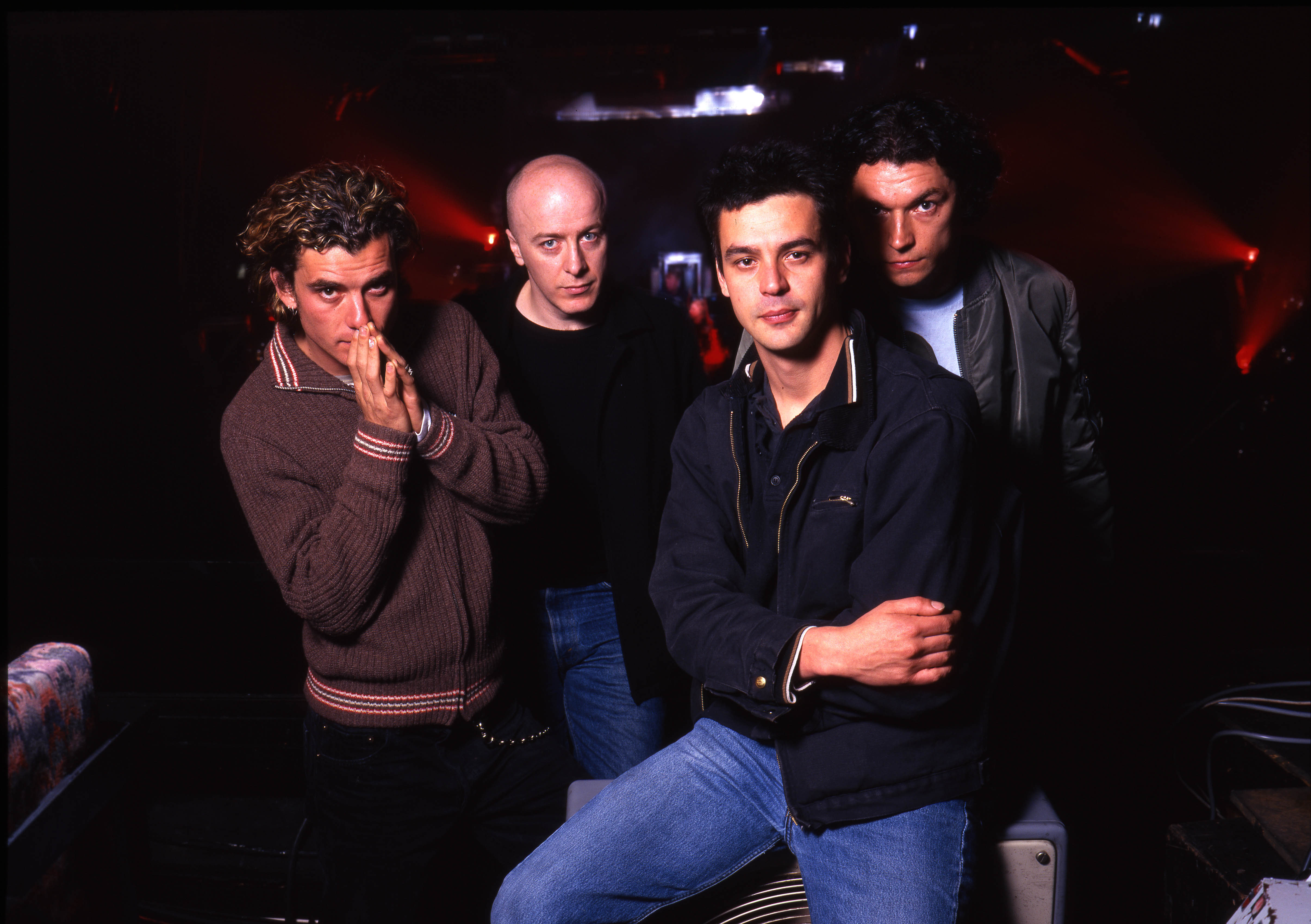This story originally appeared in the December 1996 issue of SPIN. We’re republishing it in honor of Bush frontman Gavin Rossdale’s birthday.
Bush aren’t famous. Well, at least not here in their native England. Anonymity, however, does have its benefits. Outside London’s famed Abbey Road studios, for instance. where the band are putting the finishing touches on their second album, Razorblade Suitcase, a small clique of teenage girls have better things to do than inscribe Gorgeous Gavin Rossdale‘s name on the hallowed gates, as they would in New York, Los Angeles, or anywhere in between for that matter.
Instead, they breathlessly await a glimpse of Mark Owen, ex of British pop pinups Take That, who’s also recording here at Abbey Road. A few days ago, moon-eyed Take That fans had sidled up to Rossdale in front of the studio and practically begged him for some inside information on Owen’s whereabouts. They hadn’t the faintest idea who Gavin Rossdale was. “I said, ‘I’m just the dishwasher here,'” laughs Rossdale, “‘and nobody tells me anything.'”
Rossdale and band can afford to laugh. Gathered around a TV monitor above the console at cavernous, bilevel Studio 2, the foursome—Rossdale, 29, guitarist Nigel Pulsford, 33, bassist Dave Parsons, 32, and drummer Robin Goodridge, 30—are keeping an eye on BBC2 awaiting a local news item on the subject of their wildly disproportionate U.S success.
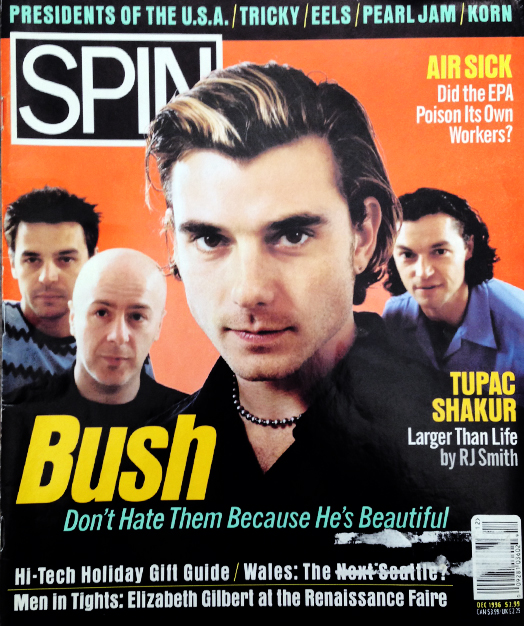
Across the room, renowned misanthrope-turned-alt-rock-production-god Steve Albini (Nirvana‘s In Utero, PJ Harvey‘s Rid of Me, the Pixies‘ Surfer Rosa) hunches over a reel-to-reel tape, razor blade in hand, slicing a chunk out of the master of their single-to-be, “Swallowed.” At Rossdale’s urging, the band’s label, Trauma, has pushed up Razorblade Suitcase‘s street date to November 19, even though their freshman effort, the quintuple-platinum Sixteen Stone, still rides high on the charts nearly two years after its release.
They’ve just returned to London after a week in New York, where they snatched up MTV’s Viewer’s Choice video award (images of high-school literary magazine phone trees spring to mind). After they cut the album tomorrow, they’re off on a well-deserved five-week hiatus. Loved ones, girlfriends, and the spoils of rock stardom await.
In short, they’re high—high on surviving 200-plus bone-crunching dates on the road, high on surviving some of the nastiest critical putdowns this side of Showgirls, high on surviving the cred problem that can arise when your singer sports fabulous cheekbones. And, oh yeah, high on pot: Rossdale smokes cheeba like Yul Brynner once smoked tobacco. Even Winston, Rossdale’s beloved Hungarian sheepdog, is so happy that he’s torn his tennis ball in half. “If the next record does well, we’ll buy another,” coos Rossdale to his hound.
Winston will have to wait, though. There’s still important work at hand, and at the moment, those hands belong to the wiry, ferretlike Albini. Contrary to his reputation for despising vocals, he’s just spent ten minutes trying to persuade Rossdale to make the whispered “simple, selfish son” line from “Swallowed” louder. “It’s intimate, Gavin,” Albini says. “Think of the trim it’ll get you.”
Pulsford, Parsons, and Goodridge—ironically, the only member of the band who didn’t sit at the back of the class at school—sit glued to the tube, shouting over to Rossdale and Albini whenever the Bush segment seems about to air. BBC2, however, like the rest of England, is in no great hurry to herald Bush: First there’s the gruesome story of a girl whose mother and sister were bludgeoned to death, then a preview of an Arsenal Football Club match, then an item on beekeepers. “We’re going to be the funny bit at the end,” quips Pulsford.
Pulsford’s right. The BBC reporters state dryly that while Bush “rival Oasis for popularity in the States”—in fact, Sixteen Stone has sales one-and-a-half times that of What’s the Story (Morning Glory)—they’re “virtually unknown here.” They go in search of Sixteen Stone in the local record store, only to find it “in the back catalog section.” Then they get personal. Taking their cameras to Shepherd’s Bush, the London suburb from which the band both hails and distilled its name, they collar random pedestrians and test their Bush awareness. “Bush? Who? Never heard of them,” replies a couple in their 30s, to huge belly laughs from Bush and Albini. Goodridge is most amused. “Next they’ll say, ‘We showed pictures of beekeeper Bill Breasley and of Bush to their mothers, side by side, and more of them recognized the beekeeper.'” Fortunately, their mothers could not be reached for comment.
***
Truth be told, for a ’90s rock star, Gavin McGregor Rossdale has not known much hardship. He spent much of his childhood in a solidly middle-class neighborhood north of London called Kilburn, not far from the posh digs surrounding Abbey Road. Gavin’s father was a doctor, a general practitioner who handled prominent people, including members of the African National Congress. His parents divorced when he was 11. He nearly flunked out of hoity-toity prep-school Westminster, his soccer career was cut short by an injury, and recently he’s suffered romantic woes, but essentially Rossdale’s got a very lazy bunch of existential demons. If any. Ask a random Londoner of his impression of any band from Shepherd’s Bush, and he’ll immediately reply, “I’d say they’re a bunch of pretentious bastards who are trying to be something they aren’t!”
Nowadays, Rossdale lives in a basement flat in West London that he’s proud to say is only a few doors down from where John Lennon once lived. On Rossdale’s kitchen table, alongside PJ Harvey, Slint, and Jesus Lizard CDs, sits a picture of the early-period Beatles, framed like a family snapshot. There are fading paintings of trees, stars, and angels all over the cement floor. The refrigerator’s full now, thanks to Jasmine Lewis, the woman Rossdale dated for five years up until last May (and is still good friends with), who’s watching telly in the den. By the kitchen window, there’s a framed copy of his Rolling Stone cover, altered to remove the line, “Why won’t anyone take Gavin Rossdale seriously?” “If you look closely, you can still see it,” he grumbles. There’s one blue guitar, tastefully displayed on a stand by his bed. The walls in his bedroom are painted blue. Rossdale’s bathtub is also blue. Very blue.
Rossdale, unlike his bathtub, is not very blue, and you don’t have to be Stephen Hawking to figure out one reason why: He may be the most photogenic man in London. His huge, doelike eyes, perfectly cleft chin, and wavy, two-tone mane seem cruelly swiped at the expense of the pallid and drawn faces in the madding crowd.
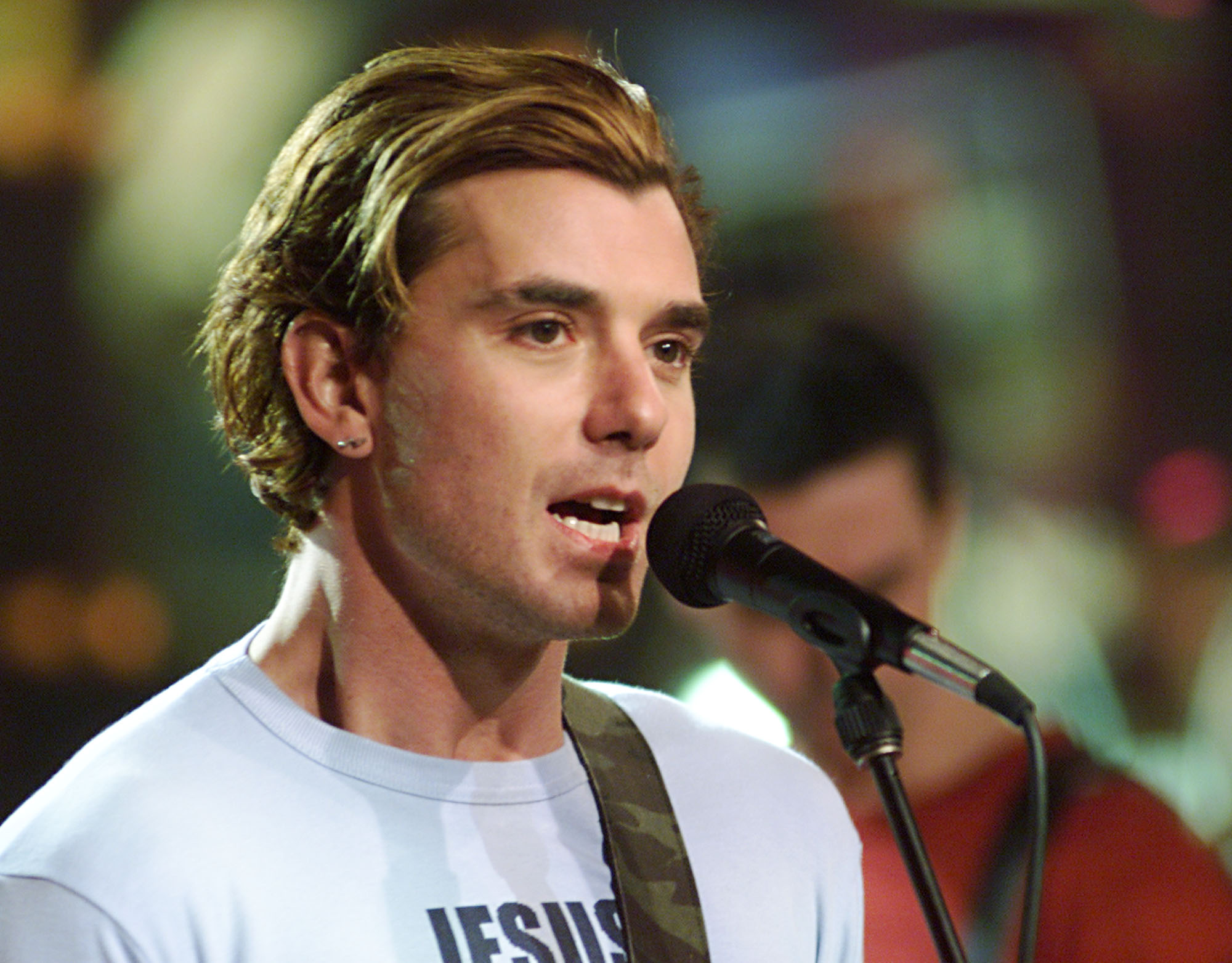
“At least I’m a boy, so I don’t get hassled about it in the street,” says Rossdale. “It’s not like I’m Claudia Schiffer. Okay, someone approached me in the street and I did a modeling job to feed my ego, but it was just once. I know I say this at the risk of sounding like the David Cassidy of rock, but I’ve never wished that I was not attractive.” And such physical good fortune does not come without its creepy by-products. “I get pictures of people who tie themselves up,” he says. “A girl sent me a picture of her naked body with her eyes cut out from a much bigger picture and superimposed on her head, like she’s supposed to be watching me.”
While all of Rossdale’s perceived beauty, decoration, and privilege may have helped to sell records, it has only inflamed Bush’s credibility problem—the one Rossdale’s so eager to shed. “I’m not good enough to show my influences where they really are,” he gripes. “I can’t quite appropriate well enough. I love the Pixies, but I still can’t sound like them.”
This is to say nothing of the frequent unfavorable comparisons, heaped on Bush by supporters and detractors alike, between his band and that of a certain defunct trio from Seattle. Though he and the band scoff at those who dub them “Nirvanawannabes,” the facts are there: He dated Courtney Love, he complains of stomach trouble, and even Dave Grohl asserts that Rossdale sings like Kurt Cobain.
Rossdale’s always had a bit of the Zelig in him: He tells me about the time his stepfather died, and he went home to help make the funeral arrangements. “I was staying with my mum, and all my stepdad’s stuff was around—his cigars, nice whiskey. I’d put my mum to bed and sit in his house and dip his cigars in his whiskey. I felt like the guy in Paul Auster’s book The Invention of Solitude, who gets to know his father by going through his things.”
As for the Kurt comparisons, he’s heard them all before. “I didn’t teach myself to sing in a certain way,” he offers. “You can’t manufacture that, you know.” The stomach trouble turned out not to be an ulcer—though they’re chronic among Rossdales—just two months’ worth of food poisoning. But on the new LP, Rossdale sings the words “contagious” and “nevermind” way up in the mix, without the slightest hint of irony or self-consciousness. “Never Mind the Bollocks was also a very famous album,” he calmly states in his defense. Strange as it sounds, though, none of it seems calculated. He just somehow compulsively sticks his Kurt in his mouth. Like a crazed fan sending a photo collage, it’s as if he can’t stop himself.
***
The key to understanding Bush is just that: They are crazed fans. All four of them are younger brothers who were introduced to rock by their older sibs as anarchy broke loose in the U.K.
“My sister bleached my hair when I was 11 and totally into being a punk,” recalls Rossdale. “I was, like, the token punk. All her friends used to pull me around corners and kiss me.”
“My big sister was my first guitar instructor,” remarks Pulsford, a soft-spoken Welshman. She plays for Cyndi Lauper now.”
“My brother was a drummer,” Goodridge remembers. “He gave me his old drum kit when he left his band, the Gonads, to go to university. He had the record player, he had the records, he had the money. I sat there as an eight- or nine-year-old kid just going ‘Wow.'”
Bush learned well at the feet of their elders; sit with them for any stretch of time, and the enthusiasm they share for their favorite rock icons will strike you as sweet and genuine (if not mushy). Rossdale was crushed when he met one idol, Patti Smith, backstage after a September concert in New York. Lacking a proper introduction, Smith spent the entire time thinking that Rossdale was from an music-industry magazine called the Gavin Report. “I’d actually had this intense 40-minute phone conversation with her about death, but she didn’t remember,” he says. “It was really embarrassing.”
Bush are well-versed in their counterculture studies. They seem to operate under the belief that if they do as their Rock Gods do, they will become as their Rock Gods are. The jet-set lifestyle fascinates them for what it represents, and they reap its benefits—all save Rossdale are new homeowners—but embracing it doesn’t play well, so they deny their enjoyment and emphasize their commitment to the music.
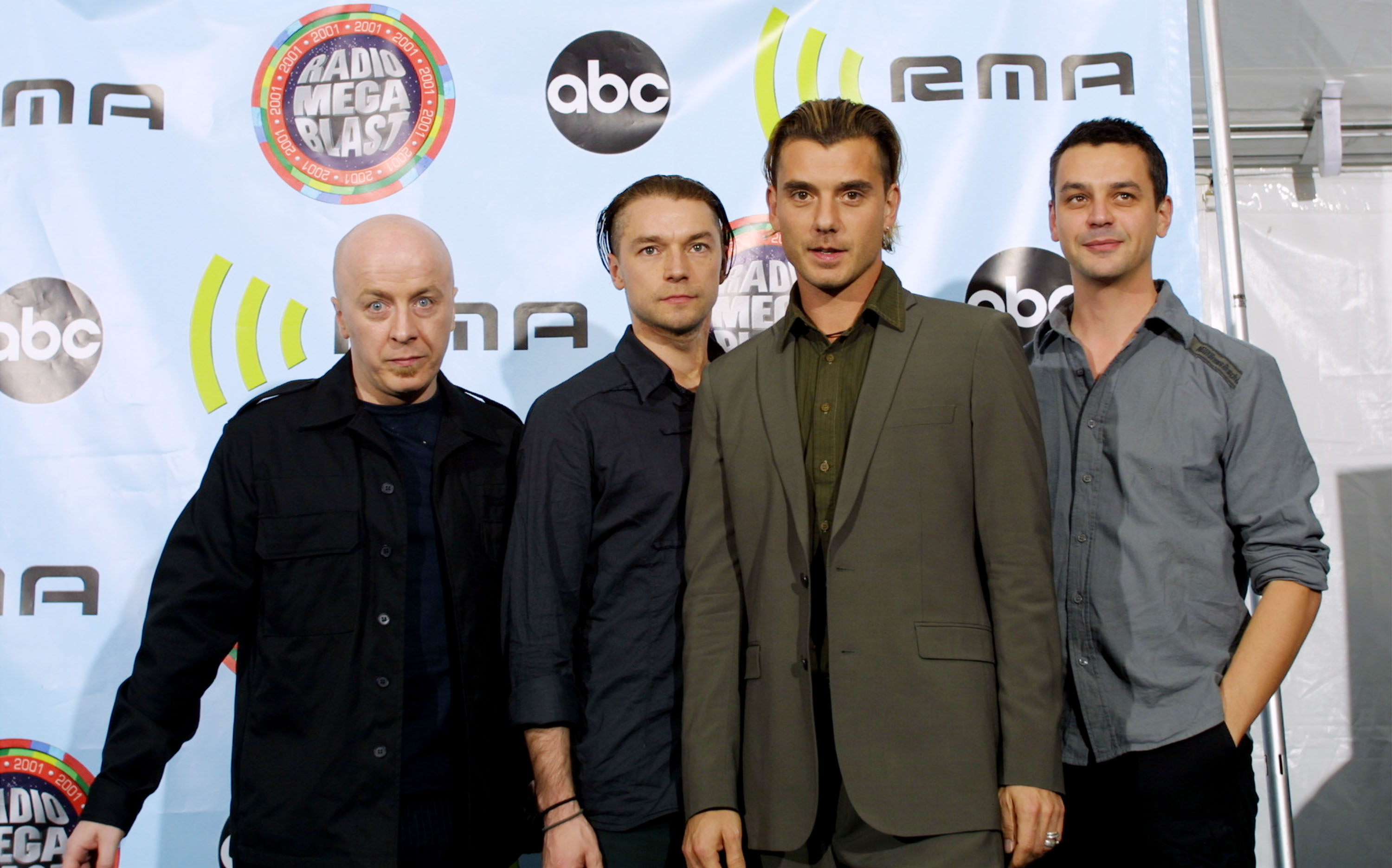
For Bush, though, even that route is lined with land mines. Cynics are certain to accuse Bush of hiring Steve Albini so that they might follow in Nirvana’s footsteps and record their In Utero, an edgy, abrasive follow-up to their commercial breakthrough. “Steve Albini has been more important to me in terms of records I’ve listened to than any other person,” says Rossdale. “In Utero is included in that, but it came out after. I’m talking about before.”
That they got the famously snobbish Albini to do it at all sent many jaws clattering to the floor. How could you, Steve? “When Bush was in Chicago,” Albini recounts, “Gavin called me. I hadn’t actually paid any attention to them other than hearing them in the ether. I went and met him at a Thai restaurant for lunch. My girlfriend, Heather, came along. She is a remarkably astute judge of character, she can spot a sucker from a mile off. She and I could both tell Gavin was a genuine guy, remarkably untouched by his success. And you couldn’t meet a more down-to-earth, hard-working bunch of guys than Bush.”
“But do you like the music, Steve?” I ask, somewhat incredulously. “Do you go home humming the tunes?”
“Well, yeah!” he blurts. “I’ve put in more time and energy on this record than any record I’ve ever done, and you can’t work on something for that long if it doesn’t have some resonance for you. Our tastes are not as far apart as people assume. Almost every day work stops because there’s a degeneration into some conversation about what our favorite records are. I think we’re pretty much all birds of a feather.”
Goodridge is in grateful awe of Albini. “I asked him, ‘Why did you want to take this job when you knew you’d get shit for it?’ He said, ‘A, you can play, and B, you got your success without big hype. People actually like your music.’ He saw through all the bullshit.”
Albini or not, Razorblade Suitcase isn’t an attempt to copy In Utero, or Pod, or the Jesus Lizard. If anything, it’s an innocent trip back to the well whence Nirvana flowed: the Pixies’ Surfer Rosa. Rossdale has not only enlisted the producer of that alt-rock touchstone but also the man who designed its cover art, Vaughn Oliver of v23, the erstwhile in-house design team at 4AD.
On Razorblade, Bush have considerably broadened their dynamic range, thrown in snippets of feedback, and added brief moments of quiet intensity that pull back in order to hit you harder. Rossdale has reinvented archetypal Bush song structure to include dramatic drop-outs and weird bridges. Pulsford, whose slide-guitar explorations ushered “Everything Zen” to the top of the modern-rock charts, bends dissonant notes like flexi-straws. And true to the Albini Sound, Suitcase contains oodles of handling noise: “Insect Kin,” “Greedy Fly,” and “Swallowed” are chock full.
So musically, Razorblade Suitcase is a vast improvement on Sixteen Stone, as good as any Albini roller coaster—emotionally thrilling, virtuosically played, and utterly infectious. What is it, then, that separates Bush from the greatness they idolize? Is it Rossdale’s exquisite bone structure? Goodridge scoffs. “I heard someone ask him about that and he said, ‘I was good-looking way before I was successful.'” Is it the ease in which the Englishmen broke the American grunge code? Perhaps on Sixteen Stone, but Razorblade shifts directions often and unpredictably enough to beat down such gripes. No, it’s a simple answer, one that wouldn’t much matter if Bush themselves weren’t so unduly concerned with their own edginess: Black Francis and Kurt Cobain are to Goofus as Gavin Rossdale is to Gallant.
Rossdale is wistful about the ones he leaves behind. On “Swallowed,” he sings, “I miss the one that I love a lot.” Cobain, on the other hand, was massively codependent: “Her milk is my shit / My shit is her milk.” Black Francis has a gross, fetishistic demand: “Bloody your hands on a cactus tree / Wipe it on your dress / And send it to me!” Rossdale has a nearly obsessive hatred of child abusers. Black Francis makes fun of a child whose “Broken Face” is the result of incest. When Black Francis gets spiritual, he appeals to the Virgin Mary for annihilation: “Elevator lady / Won’t you please run over me?” And everyone knows from “All Apologies” that Cobain’s marriage to the sun’s glory buried him. Rossdale, meanwhile, raises a glass to humanity. “Here’s to modern man!” goes the battle cry from “A Tendency to Start Fires.” “I’m screaming daisies,” he announces in “Greedy Fly.” Did anyone think he was vomiting blood?
All this compassion, earnestness, and affection may be great news for Rossdale’s friends, but it’s bad news for his lyrics. If Courtney Love is your ex and calls you “super-sweet” despite pressure from all sides to dis you, you probably are super-sweet. Trent Reznor of “two-inch nails” knows that much. “Gavin is so good-looking and confident,” Love tells me, “that he can be friends with the fat girl in class and not give a shit what his friends think.” Rossdale does his best to put his most bummed-out side forward, but he doesn’t have so many worries or vices, other than pot. He’s a nice guy—pathologically protective and kind to others, spilling over with love—and as such, he finishes last.
“He’s got a dark side…he does,” pleads Love.
Then where does he show it? I wonder.
“Umm…probably where no one can see it,” she answers. “He asked me not to say he’s nice. But I’m me and even I can’t say anything mean about him.”
Rossdale puts up only a small tussle when pressed about his beneficence. Which is not to say that he’s an egoless wimp. “You could not meet someone who has a lower threshold for letting anyone do what they want,” he insists. As both sole songwriter and obvious visual focus of Bush—last year’s smash video for “Glycerine” was essentially a solo star turn—I ask Rossdale if his bandmates ever grouse about his hogging the spotlight. “No,” he insists, “because my songs have provided everyone with a life. Everyone’s bought houses—they live in homes now. I think they’d mind if I wrote a record and it ruined their lives, but so far it’s worked really fine.”
***
Pulsford, Goodridge, and Albini are sitting together in Abbey Road’s newly renovated cafeteria. Albini’s finishing up his pasta, while a pudding awaits him, growing a skin. Parsons pops in from time to time from another table. The Razorblade Suitcase sessions have ended, and all anyone has left to do is exchange addresses and reminisce about betting on endless games of English pool. “It’s such a silly little game that anyone can beat anyone at a given moment,” says Albini. “If you could teach a monkey to hold a broomstick in his ass, he would occasionally beat a champion billiard player at English pool.”
A nearby local newspaper blares a headline about the alleged breakup of Oasis. “They haven’t really broken up,” figures Parsons. “They’re brothers. Next week they’ll have ‘Oasis back together’ on the front page.” But aren’t you a little excited that a band you’re often pitted against, a band you say has slagged you publicly, may no longer exist? “I guess it’s more interesting for you journalists when people hate each other,” says Goodridge, “but when bands are with other bands, most people are pretty cool. I saw Liam at the MTV awards, and it was good to see him. I could get together with him and have a right laugh, and you’d guys would probably report it as ‘Liam slags Bush.'”
***
The next afternoon, Rossdale and I have lunch at a plush basement restaurant in a hotel near Chinatown. Gilded leaves sit atop the Corinthian columns holding the ceiling up, and a bas-relief of a pair of griffins adorns a panel across the room, also rendered in gold. The walls support works by hotshot new artists—we’re sitting under a Mariko Mori piece. The table’s shaped like a guitar pick. We toast Rossdale’s first free day by ordering a $200 bottle of Chateau LaTour. “F–king great,” he marvels. “They’re going to decant it. Perfect.” I ask Rossdale when he became such a wine connoisseur. “All I know is that if it’s 120 quid, it’s got to be good.”
Pulsford claims that Rossdale smokes so much weed because he’s so neurotically fidgety when he’s straight, and at lunch I can easily tell that Rossdale is stone-cold sober—he polishes his knife all over the table, he looks down and away from me a lot, he arranges the sticks of matches on the table in about 20 different ways. They’re in the box, they’re out, he’s sliding the holder in and out of the sleeve, he breaks a few in half, he lines them up, he plays with the silver rings on his fingers—he’s making me nervous.
About the only thing that calms Rossdale is when the conversation turns to his beloved pooch. Rossdale acquired Winston under tense circumstances. “I looked after him one Christmas and I fell in love with him. His owners were friends of mine and they were abusing him; the guy would come home and kick him. After Christmas I was like, ‘F–k you, I’m keeping him.’ I was willing to lose the friendship. He’s like my child.” It’s true: I’ve never seen anyone pour so much sugar over a pet before; Rossdale’s gone so far as insuring Winston up to £3 million. “I heard that Trent Reznor’s dog died while he was on tour,” says Rossdale, “and that Trent was locked in his room for two days after that. I don’t know what I’d do. I’d f–king…I’d kill….” Rossdale can’t even find the words.
Rossdale moves easily from dog ownership to human relationships. When I press him on his rumored tour tryst with No Doubt‘s sports-bra feminist Gwen Stefani, Rossdale plays it cagey. “I think that she’s amazing,” he says of Stefani, “but so do a lot of people. As far as being my girlfriend, when you’re on tour with someone for three months….”
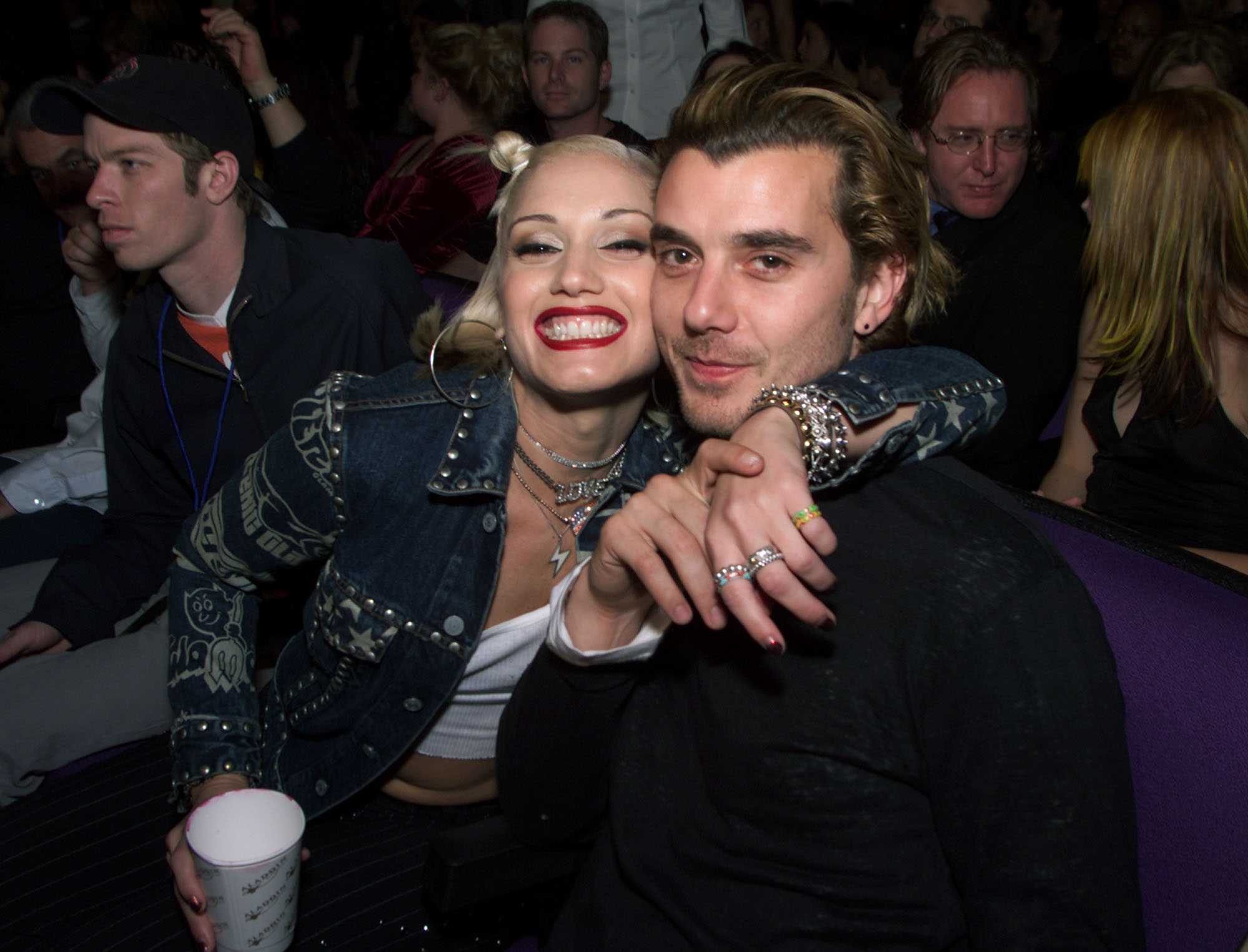
Said tour may have been instrumental in breaking Bush in America, but it also had the unintended effect of breaking up Rossdale’s five-year relationship with his former flame. At one point in our conversation he accidentally refers to his ex as “my girlfriend,” and I sense that Rossdale may not be entirely ready to shut the book on him and Lewis. “I don’t have a girlfriend,” he drawls, the words more wistful than strident. “I’m in London, living in a flat I used to share with someone for five years. I’m on my own.”
After lunch, even though his vacation has just begun and he could easily ditch me, Rossdale shows me around the old Soho haunts he hasn’t seen up close in two years. He’s shopping for a gift for a friend of the band’s, but he can also see I need a new coat, and he’s more determined than I am to find one. I can hardly keep up with him. Every few blocks he stops at an outdoor army/navy store and picks out a few styles for my approval. They’re often not my speed at all, but he somehow makes each one seem appealing. It occurs to me that Rossdale might be attempting to curry favor with the media, but when we approach a green light at a corner, he unconsciously puts his hand on my chest to prevent me from walking out into the street. Like I said, a nice guy.
We end up in a small shop in Covent Garden run by a Mediterranean wiseguy, the kind that pinches kids’ cheeks and flirts with their mothers. After Rossdale’s loaned me five pounds for a hat to go with the jacket we’ve settled on, the Med guy recognizes him, sort of.
“I remember you from when you was a kid running around in the street,” he says. “Hey, you’re dressing real well these days. What happen, you marry rich?”
“No,” sighs Rossdale. “I’m not married.”
“What you do for a living, huh?” he presses on. “I play the guitar,” says Rossdale, looking proudly into his palms. “Everything I’ve got is because of these hands.” Med guy squints at Rossdale again. There’s a pause as the two scrutinize each other. The shopkeeper strains to place him. Rossdale looks a little worried that he’s busted.
“Are you a celebrity?” the old man asks.
“No,” Rossdale replies. He isn’t even joking.

